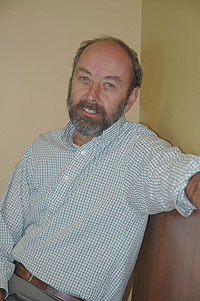January 29, 2007
Donald Wittman demystifies economics in new textbook
By
Jennifer McNulty
Thirty years ago, the public was appalled by revelations that the Ford Motor Company had weighed the benefit of building a cheaper vehicle against the cost of additional personal injury lawsuits arising from the design of its Pinto sedan.

Donald Wittman
Photo: Jennifer McNulty |
But economist Donald Wittman says Ford was doing "exactly what it should do" when it conducted a cost-benefit analysis.
If you're troubled by the notion of Ford putting a dollar value on human life, get ready for Wittman's next assertion. He says you do it, too. Every day. From the type of car you drive to the number of police officers on the street, individuals and societies are constantly striking a balance between safety and cost.
"We all put a price on our lives, every time we step out of the house," said Wittman. "It would be safer to drive a tank than a 10-year-old minivan, but we don't do it. We're limited by the amount of money we have, and, at various times, all of us make the decision that the extra safety isn't worth it."
The analysis of those trade-offs is at the heart of economics, which Wittman has demystified in his new textbook Economic Foundations of Law and Organization (Cambridge, England: Cambridge University Press, 2006).
Considered a breakthrough text because it presents economic ideas in the context of fascinating legal topics, Wittman's book engages students by addressing such questions as:
• Who owns the frozen fertilized embryos after a couple divorces?
• Must a homeowner tell prospective buyers that her house is haunted?
• Is a passerby obligated to rescue someone if the effort poses no risk to his or her own safety?
Wittman, an avid surfer, wanted to write a book that could've been titled Microeconomics Made Interesting, so he wrote short chapters, sprinkled them with compelling real-life cases, and organized the book to illustrate economic principles. Ultimately, he wanted to help students develop what he calls "economic intuition."
"Economics provides a general theory of human behavior," he explained. "When it is applied to law, it does not treat precedents and statutes as the intellectual point of departure, but instead tries to find the economic underpinnings of the law. Most of the time, the legal outcome is consistent with economic analysis."
Wittman uses the case of the fertilized embryos to illustrate cost-benefit analysis: In Davis v. Davis, the former wife wanted to use the frozen embryos to become a mother, but the former husband did not want to be the father. Ordinarily, Wittman explains, the party wanting to avoid procreation would prevail. However, the former wife was relatively old and lacked reasonable substitutes. Since it was very difficult--or costly, as an economist would say--for her to produce new embryos, she should get greater consideration.
In the haunted house scenario, Wittman discusses the economics of information. In Stambovsky v. Ackley, the seller had failed to tell the buyer the home was haunted (although it had been reported in Reader's Digest and a local newspaper). The buyer asked for the sale to be voided after he heard the allegations, and the court ruled in his favor. The outcome was sensible, writes Wittman, because when a house is reputed to be haunted, its resale value can be affected.
Economic theory weighs the costs of alternative outcomes, which is evident in Wittman's discussion of the obligation of would-be rescuers, known as the "good Samaritan rule." In the United States and England, bystanders are generally not required to take action if they come upon someone in distress, and they are rarely compensated for minor costs incurred in rescuing someone. The economic rationale is that individuals would be more likely to engage in risky behavior if they knew their potential rescuers could be held liable for not rescuing them, and that wouldn't be in society's best interest.
Continental Europe resolves this problem by instituting a pair of requirements: Bystanders are obligated to rescue when the cost is trivial, but those who are saved are liable for the costs of their rescue. "When the rescuee pays, he or she is deterred from excessively risky behavior," said Wittman."When the potential rescuer is liable for not rescuing, the person has the appropriate incentive to rescue."
Those examples, and dozens more, make Economic Foundations of Law and Organization compelling reading. The book also makes much of Wittman's own research accessible to undergraduates.
Looking back on the Pinto scandal, Wittman said Ford's mistake was in underestimating the value of a life and the harm to the victims. Asked whether the company should have disclosed to buyers the safety problems associated with the car's design (the placement of the gas tank made rear-end collisions potentially fatal due to fire or explosion), Wittman responded by thinking just like the economist he is: "The question is what happens if you force disclosure. Will the company do safety studies in the future?"
Economic Foundations of Law and Organization is not Wittman's only recent book. He and former student Barry R. Weingast (B.A., mathematics, 1973), coedited The Oxford Handbook of Political Economy (Oxford, England: Oxford University Press, 2006), a 1,100-page tome that represented an "exciting opportunity" for the editors to make their mark on the field of political economy.
"To borrow a phrase from cultural studies, political economy is 'contested' territory, so Barry and I got to decide what the field meant," said Wittman. "We wrote in the introduction that political economy is the methodology of economics applied to the analysis of political behavior and institutions. A different pair of editors might have defined the field differently, and they might not have devoted a section to war, as we did."
With 59 chapters written by international experts in their fields, the book is part of the 10-volume set of reference books published as the Oxford Handbooks of Political Science.